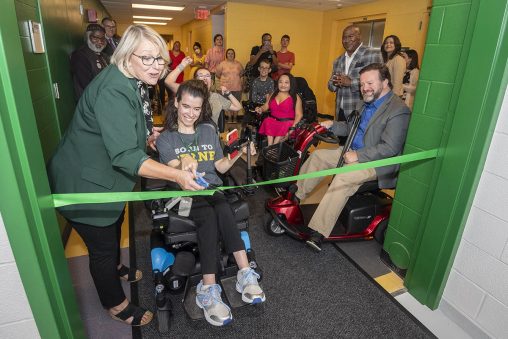
Wright State celebrated the reopening of the tunnel connecting Hamilton Hall with the Student Union, making the Dayton Campus more accessible than ever for disabled students living in that residence hall.
Wright State University’s Office of Disability Services and the Division of Inclusive Excellence unveiled two new campus features that highlight Wright State’s ongoing commitment to a positive, productive learning environment for students of all abilities and backgrounds.
The refurbishing and reopening of a long-closed portion of Wright State’s tunnel system will allow disabled students who live in Hamilton Hall to have easier access to the Student Union. This portion of the tunnel system had been closed for decades due to safety concerns.
“An amazing amount of work has gone into making the tunnel both accessible and safe, including installed cameras and access controls so that only people that live in Hamilton Hall will be able to access the residence,” said Tom Webb, who was recently promoted to associate vice president of accessibility.
With two miles of tunnels linking 20 of 23 buildings in the academic section of campus, the tunnel system has made Wright State’s Dayton Campus one of the most accessible colleges in the country. Tunnel systems are an important part of accessibility for people with disabilities, and the tunnels at Wright State have been designed with that in mind.
Sarah Davis, an undergraduate student majoring in organizational leadership, said coming to Wright State from Atlanta was a deliberate choice because of the exceptional support offered to students with disabilities.
She said that advocating for the reopening of the tunnel was a cause that was close to her heart and that when she pitched the idea, President Sue Edwards not only heard her but swiftly executed the necessary steps.
“My admiration for Wright State University runs deep, especially for the exceptional work carried out by the Office of Disability Services,” Davis said. “Their impact extends far beyond just benefiting individuals like me. They play a pivotal role in enhancing the overall experience for the diverse array of students, representing various cultures and communities.”
Wright State also opened the Disability and Neurodivergence Cultural Center in 023 Student Union.
“We are really excited to see this become a resource for our students. There are only 18 in the entire country, and we are the second in Ohio,” said Webb.

Disabled students living in Hamilton Hall now have easier access to campus thanks to the reopening of a portion of Wright State’s tunnel system.
The center’s goal is to provide disabled students a safe space to share their experiences, regardless of their disability, develop educational programming and social opportunities for students, and find ways to further weave their unique culture into the fabric of the Wright State campus.
“This center gives disabled students more of a formal presence at Wright State where they can work on programming to raise awareness and reduce stigma,” said Webb. “It’s a lot easier to process and understand physical disabilities. However, there are invisible disabilities such as ADHD or mental health issues, which account for 87 percent of our disabled students.”
While the Disability and Neurodivergence Cultural Center is under the Division of Inclusive Excellence, Webb said he anticipates that the Office of Disability Services will partner with the center on programming and other initiatives.
Lily Berkow, a social work major and president of Abilities, said she is thrilled with the newly open space that Wright State has created to serve as the physical hub for the Disability and Neurodivergence Cultural Center. Students have already started holding Abilities meetings in the center and will soon add study halls and social activities.
“I encourage all students to join us for an event in our new space. Check out Engage online to see what’s coming up,” Berkow said. “I also hope our co-location with the other cultural centers builds closer ties and collaboration with these groups. I’m super excited for the opportunity to expand our outreach and membership.”
Abilities is a student-run organization that advocates for student needs and accessibility at Wright State and in the community, spreads disability awareness, offers leadership opportunities and establishes a community of people with different abilities.
In addition to these two new campus assets, the Office of Disability Services recently streamlined its intake process.
“In an effort to align our office with the university’s academic changes, the Office of Disability Services is migrating to a new method of case management,” said Heather Rando, the new director of the Office of Disability Services. “Students will now be assigned based on their program or college, rather than by last name. Our hope is that this will lead to more seamless navigation of student accommodations and clearer channels of communication for students, faculty and staff.”
Wright State serves approximately 850 students with disabilities, about half of whom have more than one disability category.
Disclaimer: The disability community is evolving in its use of language, and there is no one-size-fits-all approach. Some people prefer identity-first language, while others prefer person-first language. In this Newsroom story, we use both terms interchangeably out of respect for the diversity of preferences within the community.

 Wright State psychology team studies ways to identify fatigue in pilots, drivers
Wright State psychology team studies ways to identify fatigue in pilots, drivers  Wright State videographer Kris Sproles wins Regional Emmy and Ohio journalism award
Wright State videographer Kris Sproles wins Regional Emmy and Ohio journalism award  Wright State Boonshoft School of Medicine ranked among the nation’s best for 2024 by U.S. News
Wright State Boonshoft School of Medicine ranked among the nation’s best for 2024 by U.S. News  Exposing biotechnology
Exposing biotechnology  Wright State faculty member Dan Noel uses unique background to inspire new leaders
Wright State faculty member Dan Noel uses unique background to inspire new leaders 